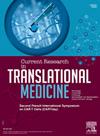2型糖尿病体回输新鲜自体血诱导巨噬细胞极化、抑制红细胞损伤的机制探讨
IF 3.2
4区 医学
Q2 MEDICINE, RESEARCH & EXPERIMENTAL
引用次数: 0
摘要
2型糖尿病(T2D)会引发炎症反应,损害红细胞。M2巨噬细胞对炎症有抑制作用,在组织损伤修复和纤维化中发挥重要作用。自体输血有可能通过介导巨噬细胞极化来抑制红细胞损伤。采用瑞士小鼠建立合适的2型糖尿病模型,并进行自体输血。处死小鼠,采集小鼠血液,分选CD14+单核细胞。流式细胞术分析CD14+单核细胞中表型分子CD16、CD32和CD206的表达水平。流式细胞术分析M1、M2巨噬细胞比例。检测红细胞Q值、P50、2,3- dpg、Na+-K+- atp酶。红细胞渗透脆性试验分析红细胞渗透脆性。Western Blot分析红细胞表面膜蛋白或转运体EPB41、S1P、GLTP、SPPL2A的表达变化。自体输血诱导巨噬细胞数量显著增加。自体输血使血细胞的状态和能力得到改善。新鲜自体血液在T2D体内回输使红细胞萎缩。红细胞相关蛋白的表达证明Fresh+T2D组红细胞损伤明显减轻。2型糖尿病患者将新鲜的自体血液回输体内,可诱导巨噬细胞向M2极化,从而抑制红细胞损伤。本文章由计算机程序翻译,如有差异,请以英文原文为准。
Exploration of the mechanism of reinfusion of fresh autologous blood in type 2 diabetic body to induce macrophage polarization and inhibit erythrocyte damage
Type 2 diabetes (T2D) triggers an inflammatory response that can damage red blood cells. M2 macrophages have inhibitory effects on inflammation and play an important role in tissue damage repair and fibrosis. Autologous blood transfusion has the potential to inhibit red blood cell damage by mediating macrophage polarization. Swiss mice were used to establish a suitable type 2 diabetes model and autologous blood transfusion was performed. The mice were executed, the blood of the mice was collected, and CD14+ monocytes were sorted. The expression levels of phenotypic molecules CD16, CD32 and CD206 in CD14+ monocytes were analyzed by flow cytometry. The proportion of M1 and M2 macrophages were analyzed by flow cytometry. The Q value, P50, 2,3-DPG and Na+-K+-ATPase of red blood cells were detected. The red blood cell osmotic fragility test analyzed the RBC osmotic fragility. Western Blot analysis was used to analyze the expression changes of erythrocyte surface membrane proteins or transporters EPB41, S1P, GLTP and SPPL2A. Autologous blood transfusion induced a significant increase in the number of macrophages. The state and capacity of blood cells improved with autologous blood transfusion. Reinfusion of fresh autologous blood in T2D body made erythrocytes shrank. The expression of erythrocyte-related proteins proved that the erythrocyte injury in the Fresh+T2D group was significantly reduced. The reinfusion of fresh autologous blood into the body of patients with type 2 diabetes can induce macrophage polarization to M2, thereby inhibiting red blood cell damage.
求助全文
通过发布文献求助,成功后即可免费获取论文全文。
去求助
来源期刊

Current Research in Translational Medicine
Biochemistry, Genetics and Molecular Biology-General Biochemistry,Genetics and Molecular Biology
CiteScore
7.00
自引率
4.90%
发文量
51
审稿时长
45 days
期刊介绍:
Current Research in Translational Medicine is a peer-reviewed journal, publishing worldwide clinical and basic research in the field of hematology, immunology, infectiology, hematopoietic cell transplantation, and cellular and gene therapy. The journal considers for publication English-language editorials, original articles, reviews, and short reports including case-reports. Contributions are intended to draw attention to experimental medicine and translational research. Current Research in Translational Medicine periodically publishes thematic issues and is indexed in all major international databases (2017 Impact Factor is 1.9).
Core areas covered in Current Research in Translational Medicine are:
Hematology,
Immunology,
Infectiology,
Hematopoietic,
Cell Transplantation,
Cellular and Gene Therapy.
 求助内容:
求助内容: 应助结果提醒方式:
应助结果提醒方式:


